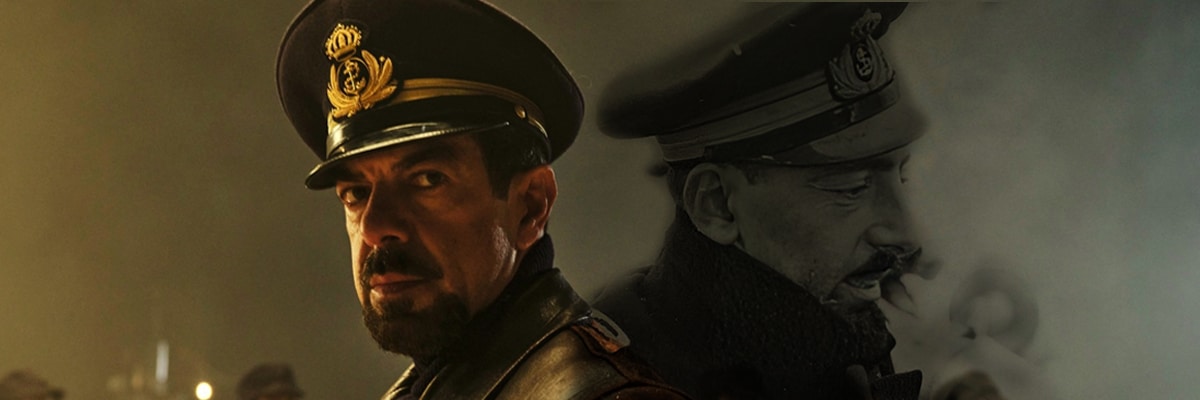Comandante, the film starring Pierfrancesco Favino as submariner Salvatore Todaro, which focuses on the famous episode of the torpedoing of the Belgian merchant ship Kabalo and the subsequent rescue of the shipwrecked crew by the Italian submarine itself, has arrived in theatres.
A story from October 1940, when the Regia Marina joined the Nazi German Navy in the Battle of the Atlantic. A seemingly anomalous film at a time when the moralising readings of cancel culture are flanked by oblivion. Instead, Comandante has the courage to tell an unbiased story about the Italy of our grandparents and great-grandparents. Even with a touch of pride, that these Italians knew how to be heroes and good people, despite the odds and despite being on the wrong side of history.
And this in spite of the fact that the film Comandante from the very beginning of its production was set in an anti-Salvini mood. The idea of the two screenwriters, director Edoardo De Angelis and writer Sandro Veronesi, insisting on a parallel between the rescue of the shipwrecked Kabalo then and the migrants in the Mediterranean today. The theme of reception also reiterated at the film's presentation in Venice. Despite these anti-Salvinian premises, the reception of Comandante was cold: the film ultimately turned out to be too patriotic and Meloni style for a certain press, as De Angelis and Veronesi's screenplay remains faithful to the historical event, even though it does not renounce some winks to current events. See also the press review on the icy reception of Comandante proposed by Sandro Consolato in Il Secolo d'Italia.
Also cooling the media reception was Pierfrancesco Favino's portrayal of Salvatore Todaro: a man from another era, a pater familias for his family and the crew. A man that as had not been seen in Italian cinema for years. Todaro refuses an invalidity pension after a flight accident (before becoming a submariner he was an observer in the Air Force), stoically refuses morphine to soothe the pain caused by the same accident, extols the courage of his men and in his letters to his wife reiterates his contempt for those who did not enlist and complain about the war economy. In punishing the castaways who commit sabotage, he decides to have the reprobates slapped by each member of the crew and the castaways, reiterating that this is the 'lesson of the fathers'. He even advises the young Belgian officer to have many children!
This (keeping silent about war and fascism) would be enough to make Comandante inadmissible to certain contemporary narratives. And in fact at the box office Comandante, where it is doing well for an average Italian movie , was lapped by the black and white neo-neorealism of Paola Cortellesi's C’è ancora domani. Where the slaps of a stereopathic patriarchy become almost trailer gags. And in the same way the press elegantly glosses over book and film, despite the fact that Sandro Veronesi's previous work, Colibrì, was the champion of reviews and articles for months after its release.
Comandante is a film about Italian wartime heroism, about Italians good people (which was not just a post-war self-exculpatory myth). A film that tries to break out of the mechanics and clichés of much Italian cinema of the last thirty years divided between penthouses in the Parioli and basements between Garbatella and Pigneto. It is a film that tells the story in a fairly objective manner and does its cinematic job of entertaining, enthralling and also making us reflect, between successful sequences and others that are less so.
Although Comandante is a film to be recovered and cherished, it remains only a glass half full. Certain cinematographic and screenplay choices seriously mar the film. It is not just a question of the uniformological (and furnishing) details, or of the telling of events surrounding the Kabalo relating to the sinking of the Eumaeus a few months later by the same crew as the Cappellini (the heroic acts of Muraglia and Stiepovich). Some aestheticising directorial choices seem out of place, such as the quotation of Rampling in The Night Porter, but above all the overdoing, filling the story with events that have nothing to do with the story of the Kabalo or the Cappellini in general.
The first rule of a historical film, especially one about peculiar or extraordinary events, should be to keep additions to a minimum. Tell the story as it is, without exaggerating. Instead, De Angelis and Veronesi exaggerate. Not only does the heroic machine-gunner Muraglia manage to shoot down a Spitifirein a berserk ecstasy, in a sequence that is certainly exaggerated (in all of Salvator Todaro's Atlantic cruises from the Cappellini's, they managed to score only one hit against the patrol planes they encountered). But the even more incredible and apocryphal episode of the coral fisherman who, during the passage of Gibraltar, voluntarily disembarked from the submarine and cut the cable of a mine. Too much is too much, and these sequences, however successful individually, distract from what should be movie core.
Indeed, in a film about Salvatore Todaro and the rescue of the shipwrecked people from the Kabalo, incredibly the facts are distorted! Todaro immediately took on board the wounded and promised the lifeboat to tow them away the next morning (towing a lifeboat by the way was not even such a unique event, the submarine Malaspina had already done it a few weeks earlier). In the film, Todaro, on the other hand, first merely provides provisions, without promising anything until the next day. And he only takes them on board after the lifeboat sinks, and after the shipwrecked people are beating on the Cappellini's hull. An inexplicable choice, tolerable in the context of winking at current events.
What is intolerable is the sequence out of any historical reality of the British warship that stops firing on the Cappellini after Salvatore Todaro radios that he is bringing shipwrecked people on board. An ‘embrassons nous’ that adds nothing to the film and offends historical truth for those who remember the story of the shipwrecked Laconia at the end of 1942. The ocean liner Laconia was torpedoed by a u-boat that also worked to rescue the shipwrecked crew and called other submarines to the area. Later, the u-boats with lifeboats in tow and Red Cross flags were attacked by US aircraft that did not want their base on Ascension Island to be discovered. A reversal therefore of historical reality that generates a poorly executed and stereotyped sequence (with Royal Navy officers ready for a gala in full dress uniform) that seems put there only to wink at the foreign film market.
In short, Todaro's choices differ from reality, the exasperated heroism in events that add nothing to the Cappellini and Kabalo story and seem more like a metacinematographic homage to De Robertis' Uomini sul fondo. And, above all, the unbearable embrassons nous with the Royal Navy. All this combined with computer graphics that are not up to the budget and reconstruction quality of Cappellini, make Comandante a film that even the generalist viewer may not fully appreciate.
So much so, in fact, that in the end, paradoxically, the scene most mentioned by the audience remains that of the Belgians explaining to the Italians how to make chips (and fortunately, a well-known brand of chips in the TV commercial reminds us that the Italians have already fried chips). In any case, Comandante remains a film to be recommended, not only because it recalls a history to be proud of and reassesses patriotism, but also because it offers much food for thought about the way it was first announced and then received.
A final note to make, it is a pity that such a production was not accompanied by some behind-the-scenes special book to help the viewer understand where historical reality ends and fantasy begins. Humbly, in our own small way, we have produced an up-to-date biography of Salvatore Todaro, and how his memory has been told from 1942 to the present day.
Essayist and popularizer, among his publications Alessandro Blasetti. Il padre dimenticato del cinema italiano (Idrovolante, 2023). With Emanuele Mastrangelo Wikipedia. L’Enciclopedia libera e l’egemonia dell’informazione (Bietti, 2013) and Iconoclastia. La pazzia contagiosa della cancel culture che sta distruggendo la nostra storia (Eclettica, 2020).









Scrivi un commento